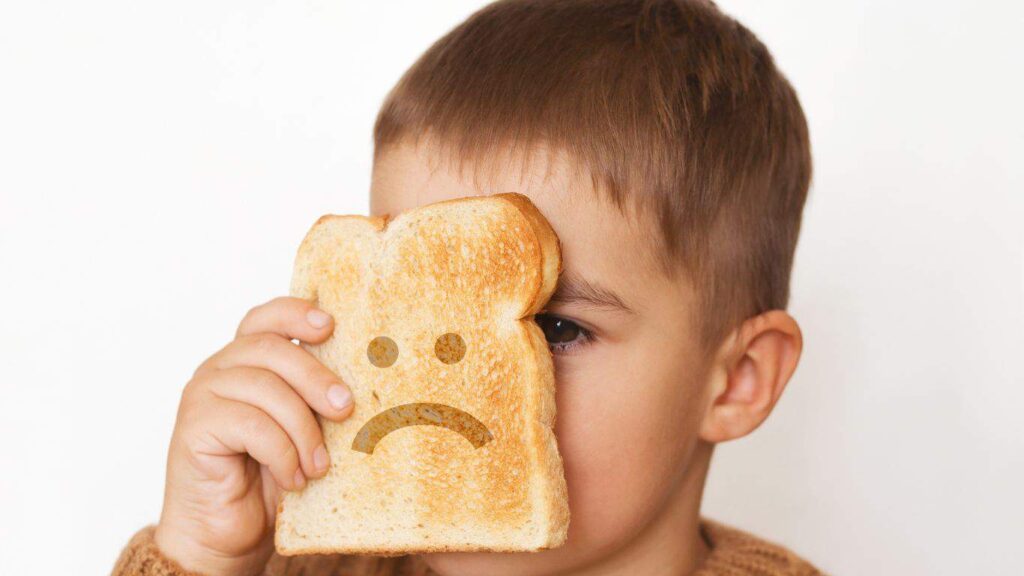Celiac Disease in Kids: Tips for Parents to Help Cope
Receiving a celiac disease diagnosis for your child, especially young ones, can be a daunting experience, not just for you as a parent but also for your little one. Children, especially young ones, may find it challenging to comprehend the implications of this autoimmune condition and the necessary dietary changes it entails.
However, with the right approach, you can help them understand celiac disease in kids in a way that alleviates their fears and empowers them to embrace a gluten-free lifestyle. The following is a guide for parents to explain celiac disease to their kids and help them cope.

Start with the Basics when explaining celiac disease to your kids
Begin by explaining that celiac disease is a condition where their body’s immune system reacts to a protein called gluten found in certain foods like bread, pasta, and cereals. When they eat gluten-containing foods, their immune system attacks the lining of their small intestine, causing symptoms like abdominal pain, poor growth, and weight loss.
Celiac Disease In Kids – Use Age Appropriate Language
Tailor your explanation to your child’s age and level of understanding. For younger children, use simple analogies or visuals to help them grasp the concept. For instance, you could liken the finger-like projections (villi) in their small intestine to tiny soldiers guarding their body against harmful substances. When they eat gluten, these soldiers become confused and start attacking their own body, leading to the symptoms they experience.

Emphasize the Good News
While the diagnosis may seem overwhelming initially, reassure your child that there is good news – the only treatment for celiac disease is following a gluten-free diet. Explain that by avoiding gluten-containing foods, their body will heal, and the symptoms will go away. This can be a powerful message, empowering them to take control of their health through their food choices. Additionally, emphasize that many delicious and nutritious gluten-free alternatives are available, ensuring that they can still enjoy their favorite foods without compromising their health. Encourage open communication and support from family and friends to help them adjust to their new dietary requirements and embrace their gluten-free lifestyle with confidence and positivity.
Celiac Disease In Kids – Involve Them In The Process
Encourage your child to be an active participant in managing their celiac disease by involving them in various aspects of their dietary management. Let them accompany you to grocery shopping trips, where they can learn to identify gluten-free products and read food labels for ingredients to avoid. In the kitchen, invite them to assist in preparing gluten-free meals, empowering them to take ownership of their dietary choices. By actively involving them in these activities, you not only foster a sense of responsibility but also provide them with valuable life skills for managing their condition independently. Additionally, this inclusive approach helps prevent them from feeling isolated or deprived, as they become more engaged in their gluten-free lifestyle alongside their family.
Celiac Disease In Kids – Educate Family and Friends
Enlist the support of family members, friends, and your child’s teacher or school nurse to create a supportive environment for your child with celiac disease. Educate them about the intricacies of celiac disease, emphasizing the importance of avoiding cross-contamination and the necessity for gluten-free options during social gatherings, school events, or birthday parties. By raising awareness and fostering understanding among those closest to your child, you can ensure they feel supported and included in all aspects of their life, contributing to their overall well-being and confidence in managing their dietary needs.
Seek Professional Guidance
If you or your child are struggling to cope with the celiac disease diagnosis, don’t hesitate to seek help from a pediatric gastroenterologist, nutritionist, or a support group. These professionals can provide valuable insights, answer your questions, and offer guidance on navigating the gluten-free lifestyle. Additionally, connecting with others who are going through similar experiences in a support group setting can provide emotional support and practical tips for managing celiac disease. Remember that you’re not alone in this journey, and there are resources and people available to help you every step of the way.
Celiac Disease In Kids – Be Prepared for Different Stages
As your child grows, your approach to discussing celiac disease in kids will evolve. For very young children under 2 years old, before their first taste of gluten, you may not need to go into much detail initially. As they start solid foods after 6 months of age, you can begin discussing gluten-free options. Toddlers aged 2-4 can understand simple explanations about their immune system and small intestine. You can use age-appropriate language and visual aids to explain how certain foods can affect their body and why they need to avoid gluten-containing foods.
For children aged 5-7, you can gradually introduce more complex concepts about celiac disease. You can explain that their body has a special system that helps keep them healthy, but for some kids like them, certain foods can make them sick. You can discuss how gluten can damage their tummy and make them feel unwell, but by eating special gluten-free foods, they can stay healthy and feel better.
For kids aged 8-10, you can delve deeper into the science behind celiac disease. You can discuss how their immune system works to protect their body and how gluten can trigger an immune response that damages their intestines. You can introduce terms like “gene variants” and “autoimmune disorders” and explain how these relate to celiac disease. Encourage them to ask questions and express any concerns about their condition.
Here are tips for your diagnosed Teens.
By tailoring your explanations to your child’s age and developmental stage, you can help them understand celiac disease and the importance of following a gluten-free diet in a way that’s meaningful and empowering.
Genetic Considerations
Celiac disease in kids often has a genetic predisposition, meaning it tends to run in families. If you have a first-degree relative, such as a parent or sibling, with celiac disease, your child is at a higher risk of developing the condition.
Having another family member with celiac disease can also make it easier to explain the diagnosis and dietary restrictions to the newly diagnosed child, as they may already be familiar with the condition and its management.
If you suspect your child may have celiac disease or if there’s a family history of the condition, it’s essential to consult with a healthcare professional for proper evaluation and testing. Early detection and management can help alleviate symptoms and prevent potential complications associated with celiac disease.
Managing the Gluten-Free Diet
Adhering to a lifelong gluten-free diet is the only way to treat celiac and allow the lining of the intestine to heal. Read food labels carefully and avoid gluten-containing foods with wheat and other grain sources of gluten. Cross-contamination is a risk at birthday parties, friends’ houses, etc. An allergic reaction to gluten (like vomiting) may actually indicate non-celiac gluten sensitivity or a wheat allergy rather than celiac disease.
Support for the Journey
The dietary changes for managing celiac disease can seem daunting at first. A social worker or support group can provide guidance, especially in the first year after diagnosis, offering practical tips and emotional support for both you and your child. Additionally, working closely with your child’s medical team for follow-up appointments is crucial to monitor their growth, nutritional status, and any ongoing symptoms. With proper preparation, education, and support, your child can learn to make gluten-free choices that not only manage their condition but also allow them to thrive and live an active, healthy life.
These websites are beneficial to read more about celiac disease:
Be Patient and Positive
Adjusting to a gluten-free diet can be challenging, especially for young children who may miss their favorite foods or feel left out at social events. Be patient, and understanding, and celebrate their efforts. Remind them that by adhering to this lifestyle, they are taking the best possible care of their body and ensuring a healthy life.
Remember, explaining celiac disease to young kids requires patience, creativity, and a positive attitude. By making the process as simple and empowering as possible, you can help your child develop a healthy relationship with their condition and embrace the gluten-free lifestyle with confidence.
As parents, we may initially feel overwhelmed by our child’s celiac diagnosis. However, it’s essential to recognize that this journey is manageable, and with time and support, it will get easier. By empowering our children to be aware of their nutrition from an early age, we can turn this diagnosis into an opportunity for growth and resilience. Remember, you’re not alone in this journey. Together, we can navigate the challenges of celiac disease and ensure our children lead healthy, fulfilling lives.






